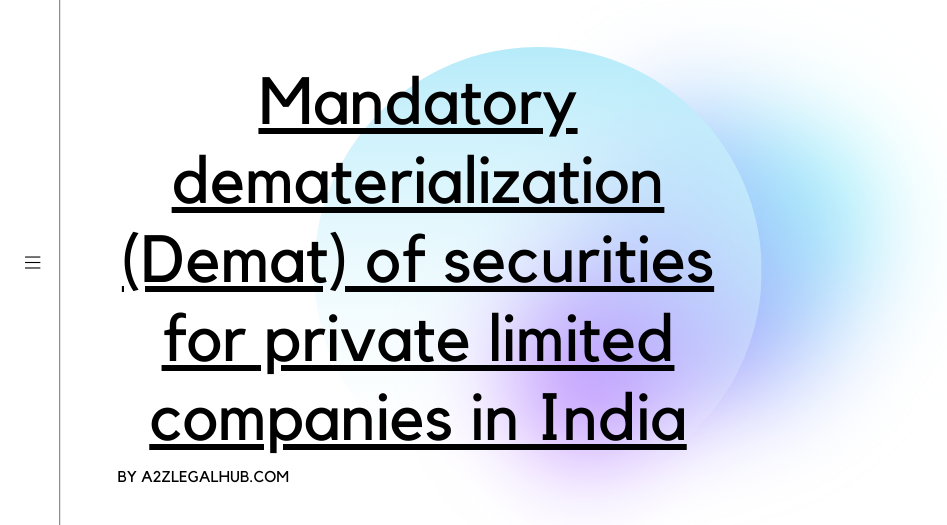Is Dematerialization now mandatory for private companies in India?
Yes, The Ministry of Corporate Affairs (MCA) has now issued the Companies (Prospectus and Allotment of Securities) Second Amendment Rules, 2023, effective from September 30, 2024. This new rule makes it mandatory for non-small private limited companies to dematerialize their existing securities and ensure that all further issuances and transfers are in Demat form. This means that all physical shares of these companies will need to be converted into electronic form.
The MCA has taken this step to promote transparency and efficiency in the corporate sector. Dematerialized shares are easier to trade and transfer, and they are also less susceptible to fraud.
To dematerialize their shares, private companies will need to open a demat account with a depository participant (DP). The DP will then convert the physical shares into electronic form and credit them to the company’s demat account.
Once the shares have been dematerialized, the company will need to issue dematerialized share certificates to its shareholders. The shareholders can then open demat accounts with DPs of their choice and have their shares transferred to their accounts.
The MCA has provided a timeline of 18 months for private companies to comply with the mandatory dematerialization requirement. This means that all private companies (other than small companies and government companies) will need to dematerialize their shares by September 30, 2024.
1. Applicability of Rule 9 of the Companies (Prospectus and Allotment of Securities) Second Amendment Rules, 2023:
1. Applicable on Public Limited Companies w.e.f.02nd October, 2018
2. Applicable to Non-Small Private Limited Companies w.e.f. 30th September 2024.
2. Non-Applicability of Rule 9 of the Companies (Prospectus and Allotment of Securities) Second Amendment Rules, 2023:
The provision of Demat of Securities shall not be applicable on the following Companies:
1. Nidhi Company
2. Government Company
3. Wholly Owned Subsidiary Company of Public Company
4. Small Private Limited Companies
Small Company:
“small company” means a company, other than a public company,
i. paid-up share capital of which does not exceed Four Crore rupees or such higher amount as may be prescribed and
ii. turnover of which as per profit and loss account for the immediately preceding financial year does not exceed Forty crore rupees or such higher amount as may be prescribed.
Provided that nothing in this clause shall apply to—
(A) a holding company or a subsidiary company;
(B) a company registered under section 8; or
(C) a company or body corporate governed by any special Act;
Here are some of the benefits of dematerialization:
• Reduced risk of loss, theft, or damage to physical shares.
• Easier and faster transfer of shares.
• Reduced transaction costs.
• Increased transparency and efficiency in the corporate sector.
• Improved corporate governance.
PROCESS OF COMPLIANCES:
FIRST STEP:
In accordance with Rule 9B, all holders of securities in a Non-Small Private Limited Company are mandated to transfer their shares in Demat form only after 30th September 2024. To facilitate this transition, shareholders require the International Securities Identification Number (ISIN) of the company.
Under Rule 9B(5) and Rule 9A(4) of the Companies Act, 2013, it is the company’s responsibility to grant shareholders the opportunity to convert their shares into Demat. Hence, every Non-Small Private Limited Company is required to apply for ISIN on or before 30th September 2024.
Opinion: It is imperative for all Non-Small Private Limited Companies to apply for ISIN, irrespective of shareholders’ intent to transfer shares. The company holds the responsibility to facilitate dematerialization for its shareholders.
Consequences: While Rule 9B does not specify penalties, Section 450 of the Companies Act dictates that in the absence of prescribed fines, the company and every officer in default may face fines up to ten thousand rupees. For continuing contraventions, an additional fine up to one thousand rupees for each day beyond the initial contravention period may be imposed.
SECOND STEP:
As per the first step it is concluded that it is mandatory for Non-Small Private Limited Company to apply for ISIN. In second step what are the compliances on Non-Small Private Limited Company after allocation of ISIN:
As per Rule 9A(8), every Non-Small Private Limited Company governed by this rule is obligated to submit Form PAS-6 to the Registrar of Companies within sixty days from the conclusion of each half-year, and it should be duly certified by either a company secretary in practice or a chartered accountant in practice.
Opinion: It is essential to note that every Non-Small Private Limited Company is mandatory required to file the Reconciliation of Share Capital Audit Report with the Registrar of Companies (RoC) within 60 days of the end of each half-year. The due date of filing for both the half-year ending on 31st March (with a due date of 30th May) and the half-year ending on 30th September (with a due date of 29th November).
Consequences: While Rule 9A does not specify penalties, Section 450 of the Companies Act dictates that in the absence of prescribed fines, the company and every officer in default may face fines up to ten thousand rupees. For continuing contraventions, an additional fine up to one thousand rupees for each day beyond the initial contravention period may be imposed.
THIRD STEP:
In third step further compliances on Non-Small Private Limited Company after allocation of ISIN:
A. Make timely payment of Fees (admission as well as annual).
B. Maintenance of Security deposit of 2 year’s Fees, as per agreement executed with the Depository, Registrar to an issue, Share Transfer Agent etc.
C. Comply with the regulations, guidelines or circulars, if any issued by the Securities and Exchange Board or Depository from time to time.


Geeat